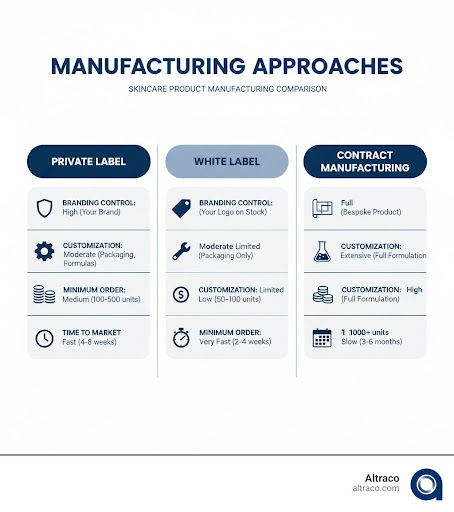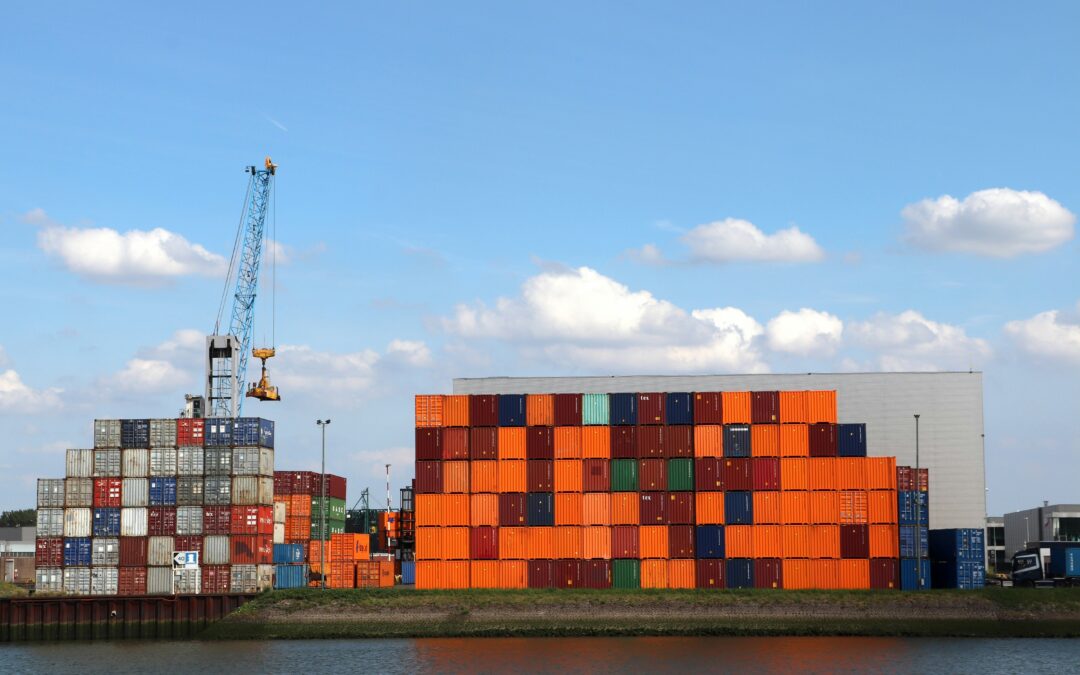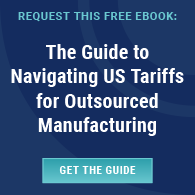Private label manufacturing offers businesses a proven path to enter competitive markets without the immense cost and complexity of in-house product development. By partnering with an experienced manufacturer, you can launch products under your own brand, controlling the marketing and customer experience while leveraging established production expertise.
This approach is especially effective in categories like home improvement, sporting goods, automotive parts, and outdoor products, where durability, safety, and compliance are essential.
Key Benefits of Private Labeling:
- Speed to Market: Launch products in weeks, not months or years.
- Lower Investment: Start with low minimum order quantities (MOQs).
- Brand Control: Apply your own unique branding and packaging.
- Higher Margins: Sell directly under your brand, avoiding retail markups.
- Proven Products: Access libraries of tested stock products.
While many consumer categories use this model, the principles are universal. At Altraco, we apply this model to help businesses source a wide range of consumer goods, specializing in home improvement, sporting goods, automotive parts, and outdoor products. With over 40 years of experience, we support manufacturing outside the United States—specializing in Mexico, China, and Vietnam—and we can establish trusted relationships in other countries as needed to deliver quality products cost-effectively.

The Private Label Process: From Concept to Customer
Starting your private label journey is more straightforward than you might think. The beauty of this model is its simplicity: you’re not reinventing the wheel but putting your unique spin on proven products and processes. It’s about leveraging decades of manufacturing expertise to bring your vision to life without the headache of building from scratch.
The journey typically unfolds in a series of logical steps: Market research helps you understand customer needs, and niche identification sharpens your focus. Manufacturer selection connects you with a production partner who shares your quality standards. From there, you move to product selection and sampling, followed by branding and packaging. Finally, production and quality control ensures every item meets your standards before logistics and fulfillment gets your products into customers’ hands.
At Altraco, we’ve spent over 40 years perfecting this process. Our global manufacturing relationships in countries like Mexico, China, and Vietnam give you access to cost-effective production without compromising quality. We handle the complexities—tariff navigation, regulatory compliance, and supply chain coordination—so you can focus on building your brand. For a deeper dive, check out our comprehensive services.
Step 1: Product Selection and Prototyping
This is where your idea becomes a tangible reality. You have two main paths:
Stock products are like choosing from a catalog of proven designs. Leading manufacturers offer libraries of tested products, from sporting goods to home improvement essentials. These items have already been through rigorous testing and are ready for your branding. The advantage is speed and affordability, with lower minimum order quantities ideal for startups.
Custom products are your blank canvas. Working directly with engineers and designers, you can create something entirely unique to your brand’s specifications. This could be a piece of camping equipment with an innovative feature or an automotive accessory with a specific design. Custom work typically requires higher minimum orders and development fees, but the result is a proprietary product that’s entirely yours.
Material sourcing is critical regardless of the path you choose. The best manufacturers prioritize high-quality, durable materials and adhere to strict Good Manufacturing Practice guidelines. Our global partnerships ensure access to the right materials at competitive prices.
Testing and evaluation is the final check. Comprehensive testing ensures your products are durable, safe, and perform as expected. Manufacturers provide samples for you to personally evaluate before committing to a full production run.
Step 2: Branding, Packaging, and Labeling
This stage transforms a generic product into a reflection of your brand. Your brand identity—your values, personality, and promise to customers—should be evident in every detail.
Packaging selection is your product’s first impression. Whether you need minimalist boxes for home goods or rugged packaging for outdoor gear, your choice should be both functional and brand-aligned. Many manufacturers now offer sustainable, recyclable options, a key selling point for conscious consumers.
Label design must communicate essential information while reinforcing your brand aesthetic. Many manufacturing partners provide in-house graphic design support to ensure your labels look polished and professional.
Regulatory compliance is a critical, non-negotiable step. Different industries and regions have specific labeling and safety standards. For example, home improvement and outdoor products may require UL/ETL, CE, or RoHS marks, while automotive parts must align with SAE specifications and applicable FMVSS requirements. With four decades of experience navigating complex international regulations, we ensure your products meet all compliance standards in your target markets, with production centered outside the United States in Mexico, China, and Vietnam—and the capability to establish compliant supply chains in other countries as needed.
Key Benefits and Common Costs of Launching a Private Label Brand
Launching your own private label product line is an exciting venture. The good news is that the benefits of this model often far outweigh the initial investment.
Benefits of Private Labeling
Think of private labeling as the express lane to market entry. While competitors are bogged down with R&D and factory logistics, you can cruise toward your first product launch.
Speed to market is a major game-changer. Instead of spending years developing products, you can launch in just a few weeks by selecting from proven, tested stock items. When a new market trend emerges, you can pivot quickly and capitalize on the demand.
Lower startup costs make this opportunity accessible. Traditional manufacturing requires massive upfront investments. With private labeling, you can launch an entire product line for a fraction of that cost. Some manufacturers offer minimum order quantities (MOQs) as low as 50-100 units per product.
Brand control remains entirely in your hands. Your logo, your story, your packaging design—it all belongs to you. You are building your own brand equity and customer loyalty over time.
Higher profit margins can be substantial. By working directly with a manufacturer and eliminating intermediary markups, you capture more of the value you create.
Common Costs Associated with Starting a Private Label Line
Of course, launching a brand requires a budget. Here are the typical costs to plan for:
Sample fees are your first expense, allowing you to “try before you buy.” Many manufacturers credit these costs toward your first full order.
Minimum Order Quantity (MOQ) costs represent your primary inventory investment. Your total cost will depend on the price per unit and the number of different products you launch. Custom products typically require higher MOQs than stock items.
Packaging and design fees vary. Many manufacturers include basic label design, while custom packaging or extensive graphic design work may incur additional one-time fees.
Don’t forget your marketing budget. Even the best products need visibility. This includes website development, social media, and advertising. Quality marketing is essential for success.
Here’s how the numbers stack up compared to going it alone:
| Feature | Traditional Manufacturing | Private Label Manufacturing |
|---|---|---|
| Initial Investment | Very High | Low to Moderate (often under $1,000 for a full line) |
| Time to Market | Long (years) | Short (weeks to a few months) |
| Brand Control | High | High |
At Altraco, we help businesses steer these cost considerations. Our global manufacturing relationships and expertise in tariff optimization ensure you get the best value for your investment, helping turn a promising launch into a profitable business.
Choosing Your Products and Finding the Right Manufacturing Partner
The success of your private label venture hinges on two critical decisions: selecting the right products for your target market and partnering with a manufacturer who shares your vision for quality. Everything needs to work in harmony.
The principles of product selection and partner vetting apply across industries, from sporting goods to automotive parts.
Identifying Profitable Product Niches
The key to success is often finding a specific niche rather than competing in a broad, crowded market. Consider opportunities in the sectors Altraco specializes in:
- Sporting Goods: Instead of generic weights, you could focus on portable, travel-friendly workout gear, eco-friendly yoga mats, or specialized resistance bands for physical therapy.
- Home Improvement: Look beyond basic tools. Opportunities exist in smart home devices, ergonomic garden tools made from sustainable materials, or clever home organization solutions.
- Outdoor Products: The market is vast. You could develop a brand around ultralight camping equipment, solar-powered camp lighting, or durable, weather-specific gear for niche outdoor activities.
- Automotive Parts: Focus on a specific vehicle type or user. You could offer custom-fit interior accessories, performance parts for a specific car model, or a line of eco-friendly car care products.
The real opportunity lies in identifying an underserved customer need and creating a product that solves their problem better than existing options.
What to Look for in a Manufacturing Partner
Choosing your manufacturer is like selecting a business partner. Here’s what to prioritize:
- Experience and Reputation: Look for partners with decades of industry experience. They bring proven processes, deep knowledge, and established supply chains.
- Product Quality and Innovation: A great partner prioritizes premium materials and offers well-engineered products. They should be transparent about their quality control processes and material sourcing.
- Certifications: Depending on your industry, certifications (e.g., ISO for quality management, specific safety standards for electronics) are crucial. They reflect a commitment to quality and safety.
- Minimum Order Quantities (MOQs): Ensure the manufacturer’s MOQs align with your budget and business plan. Some offer low MOQs for stock products, while custom items require a larger commitment.
- Full-Service Capabilities: The best partners offer a “one-stop” solution, providing support with design, packaging, regulatory guidance, and logistics. This simplifies the process and ensures consistency.
- Regulatory Knowledge: Your manufacturer must understand the compliance standards for your target markets. This expertise is non-negotiable and protects your business from legal and financial risk.
Altraco’s experience in global supply chain management helps businesses vet manufacturing partners worldwide. We support nearshore and offshore manufacturing outside the United States—specializing in Mexico, China, and Vietnam—and can establish relationships in other countries to match your requirements. The key is finding a partner who can bring your vision to life reliably.
Differentiating Your Brand and Effective Marketing Strategies
In any competitive market, simply having a good product isn’t enough. You need to stand out and tell a unique story. Differentiating your private label products and employing effective marketing are key to capturing attention and building a loyal customer base.
Standing Out in a Crowded Market
How do you ensure your brand doesn’t get lost in a sea of options? The secret lies in being genuinely different.
- Targeting a Niche Audience: Instead of trying to appeal to everyone, focus on a specific group. Are you selling automotive accessories for electric vehicle owners? Or outdoor gear for families who camp with kids? Speaking directly to their needs makes your message resonate.
- Unique Product Story: What makes your product special? Perhaps you’re using an innovative, durable material in your sporting goods, or your home improvement tools have a unique ergonomic design. This story is why a customer should choose you.
- Compelling Branding and Packaging: Your packaging is your silent salesperson. Whether you choose minimalist elegance for home goods or rugged, vibrant designs for outdoor gear, consistency builds brand recognition and trust.
- Superior Customer Experience: Excellent customer service, helpful content, easy returns, and a seamless shopping experience can turn one-time buyers into loyal advocates for your brand.
- Values-Driven Approach: Today’s consumers often support brands that share their values. This could mean a commitment to using recycled materials, ensuring ethical production, or donating a portion of profits to a relevant cause.
Marketing Your New Product Line
Once you’ve crafted a unique brand, it’s time to share it with the world.
- Social Media Marketing: Use platforms that are relevant to your niche. For visual products like home goods or sporting equipment, Instagram and Pinterest are ideal. Show your products in action and engage with your community.
- Influencer Collaborations: Partner with credible voices in your niche. A trusted review from a popular DIY YouTuber or a fitness influencer can provide a massive boost in credibility and reach.
- Content Marketing: Position your brand as an expert. Create blog posts or video tutorials that solve your customers’ problems. If you sell camping gear, create a guide to “Beginner Camping.” If you sell automotive parts, create an installation tutorial.
- E-commerce Optimization: Your website must be fast, mobile-friendly, and easy to steer. High-quality photos, clear product descriptions, and a simple checkout process are essential to converting visitors into customers.
Many private label partners can offer support with fulfillment and e-commerce integration, streamlining your operations. For more on industry trends, Read our latest insights to learn from our experience in global manufacturing and brand building.
Private Label Opportunities in Key Industries
The private label model is incredibly versatile. The same principles of speed, cost-savings, and brand control apply just as well to sporting goods, home improvement, automotive parts, and outdoor products as they do to any other consumer category. At Altraco, we’ve spent decades applying this approach across diverse product lines, helping businesses tap into global manufacturing expertise.
Our key advantage lies in our deep experience with offshore partnerships in manufacturing hubs like Mexico, China, and Vietnam. We’ve built trusted factory relationships and know how to steer the complexities of global supply chains, including tariffs and logistics, to deliver quality goods on time and on budget. Learn about contract manufacturing and how we can streamline your product development.
Private Labeling in Sporting Goods
The fitness market is booming. Private labeling allows you to launch your own brand of high-quality gear without becoming an expert in material science.
- Yoga Mats & Accessories: Offer mats with unique textures, eco-friendly materials, or custom-printed designs that reflect your brand’s ethos.
- Resistance Bands: Source high-quality bands in custom colors and resistance levels, branded with your logo and packaged to your specifications.
- Specialized Athletic Gear: From innovative training accessories to portable workout equipment, private labeling allows you to expand your offerings with products that feature material innovation for improved durability and performance.
Private Labeling in Home Improvement & Outdoor Products
The DIY and outdoor living markets are ripe for private label brands that offer good value and unique features.
- Smart Home Devices: Your brand could offer smart plugs, sensors, or lighting solutions under a cohesive brand, sourced from specialized electronics manufacturers.
- Eco-Friendly Tools & Garden Accessories: Meet consumer demand with sustainable garden tools, ergonomic home repair kits, or planters with distinctive designs.
- Camping Equipment: Differentiate with tents featuring innovative setup mechanisms, climate-specific sleeping bags, or unique portable cooking gear. Reliability is critical, and our partners deliver it.
Private Labeling in Automotive Parts
The aftermarket automotive industry thrives on private labeling, offering quality components at competitive prices.
- Aftermarket Components: Offer cost-effective, high-quality replacement parts like filters or brake components that meet or exceed OEM specifications.
- Custom Accessories: Create a niche with custom-fit floor mats, specialized car organizers, or unique styling elements for specific vehicle models.
- Performance Parts: This lucrative niche requires rigorous quality and safety standards. Our experience with precision manufacturing ensures parts perform reliably under demanding conditions.
Across all these industries, navigating global supply chains and ensuring quality control is a major challenge. That’s where Altraco’s expertise becomes your strategic advantage.
Conclusion
The journey into private label manufacturing opens doors to incredible opportunities in thriving markets. We’ve covered the path from concept to customer: understanding the model, navigating the process, weighing benefits against costs, and finding the right manufacturing partner for your vision.
The power of the private label model is that it levels the playing field. You don’t need millions in capital to launch a professional product line. Instead, you can focus on what you do best: building your brand story and connecting with customers, while your manufacturing partner handles the production.
However, the global manufacturing landscape is complex. This is where Altraco’s expertise becomes your compass. With over 40 years of experience, we’ve built trusted factory relationships in key hubs like Mexico, China, and Vietnam. We provide more than just cost savings; we deliver peace of mind through quality products delivered on time.
Our tariff navigation expertise ensures your products reach their markets efficiently, protecting your margins from unexpected costs. We’ve helped businesses from startups to Fortune 500s turn their visions into reality, specializing in home improvement, sporting goods, automotive parts, and outdoor products.
The global marketplace is full of possibilities. With the right partner by your side—one who understands both the opportunities and the challenges—you can steer this landscape with confidence.
Ready to transform your product idea into a market reality? Launch your wholesale product line with an expert partner and let’s build something remarkable together.

Al is an entrepreneur, founder, and owner of multiple businesses, including Altraco, an outsourcing and contract manufacturing company. Working across multiple continents and trusted by Fortune 500 companies, Al finds innovative solutions to traditional supply chain challenges. He is a member of Vistage Worldwide.


